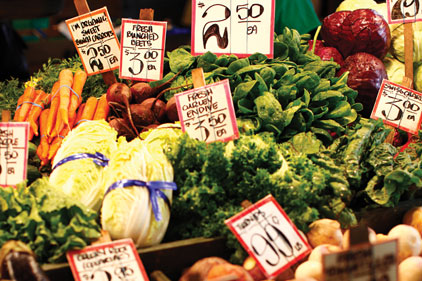Canadians Looking Local

The study also revealed that:
- Canadians are most likely to buy Canadian food products when grocery shopping for vegetables (91%), fruit (86%), poultry (84%), cheese (81%), and beef (78%).
- The number one benefit cited for buying Canadian food when grocery shopping is supporting Canadian producers (28%). Freshness (14%), the environment (10%), and safety (9%) are also recognized as top benefits.
The Food Day Canada movement was founded in 2003 by Anita Stewart, a culinary activist. Starting this weekend, 250 restaurants across Canada will offer a special menu with Canada-only selections, and a number of awards will be given out for particularly creative options. There is also a Do-It-Yourself Guide, so no matter where Canadians find themselves - in the kitchen, at the backyard BBQ or a riverside campsite - they can also "Join the Party" and celebrate local food.
"Food Day Canada is the time and place for Canadians to have fun and celebrate local food, the important contributions of local producers to our rich and diverse culinary heritage, our delicious northern bounty and the best managed food system on the planet," said Stewart, president, Food Day Canada.
"Food safety is a major issue for Canadian consumers and the ability to trace the source of their food to a trusted source is very important to them. Consumers are responding by purchasing produce and other food items from local producers, which is crucial to the health of the local economy as well," said Kenrick Jordan, Senior Economist, BMO Capital Markets.
Regional Trends
Canadians' buy-local orientation is strongest for those food items for which their regions are renowned: in British Columbia, fruit and wine, beef in Alberta and the Prairies, fruits and vegetables Ontario, cheese in Quebec and fish in Atlantic Canada.
Ontarians and British Columbians are willing to pay the highest premium for Canadian-made products, in particular fresh fruits and vegetables and meat products.
Atlantic Canadians are the most likely to buy Canadian food products when they shop for groceries. This local orientation is most pronounced when it comes to fish (Atlantic Canada: 60%, Canada: 53%).
Ontario and British Columbia residents are the most likely to buy Canadian when they shop for wine, reflecting the vibrant wine industries in those two provinces.
Albertans are the most likely to buy local when they shop for beef (83%).
Quebeckers are the most likely to buy their local food from fruit and vegetable stands.
Survey results cited are from online interviews with a random sample of 1,011 Canadians 18 years of age and over, conducted by Pollara between May 18 and May 23. A probability sample of this size would yield a margin of error of ±3.1%, 19 times out of 20.
Looking for a reprint of this article?
From high-res PDFs to custom plaques, order your copy today!






